Contacted by AyiboPost, the thirty-year-old who actively took part in the resistance against the armed gangs affirms that “an entire system” was organized to deliver Solino to the bandits
Jelin Esaï Jules, a political activist now a refugee in New Jersey, in the United States, accuses the Haitian authorities of having abandoned the Solino neighborhood, which finally fell into the hands of gangs in November 2024.
Contacted by AyiboPost, the thirty-year-old who actively took part in the resistance against the armed gangs affirms that “an entire system” was organized to deliver Solino to the bandits.
On October 17, gang attacks on the slum intensified.
Despite the presence of the police and agents of the multinational force, the gangs continued to organize themselves to attack the popular district located between the communes of Port-au-Prince and Delmas.
“On October 14 and 16, several pick-ups unloading individuals in areas around Solino were spotted by residents,” Jules tells AyiboPost.
Concern among residents was at its peak.
On October 17, 2024, the day of the attack which led to the invasion of the shantytown by the gangs, Jules says that journalists working for major international channels accompanied the bandits and filmed their abuses.
“They knew,” he said, referring to these foreign professionals. “They stayed for several days,” he adds.
To have been present during these events, Jelin Esaï Jules believes that these press workers had to have been aware of what was to come, with a guarantee from the bandits that no harm would come to them.
Jules says that journalists working for major international channels accompanied the bandits and filmed their abuses.
Accusations of collusion between gangs and the international press are widespread.
For about three years, foreign journalists have regularly come to Haiti to meet gang leaders.
In September 2024, gang leader Jimmy Cherizier, nicknamed ‘Barbecue’, himself published a video on social media showing gifts, including balaclavas, given to him by two journalists from Reuters media.
In an article published by AyiboPost in September 2024 relating to these facts, the executive director of the National Human Rights Defense Network (RNDDH), Pierre Espérance, stressed that this type of present can be interpreted as a type of validation of the bandits’ actions.
Read also: Controversy over gifts from Reuters journalists at Barbecue
In November 2019, the gang led by Barbecue invaded the Bel-Air district as well as Ruelle Maillart.
He and his men murdered at least 24 people, according to a RNDDH report published in December of the same year.
They injured 5 then set fire to around 30 houses.
To escape this wave of unprecedented violence which had already lasted several months, hundreds of families took refuge on the grounds of Celtic Park in Solino, commonly known as Teren Pè.
Through his involvement in various organizations within the community, Jelin Esaï Jules found himself in charge of the center.
But the man says he quickly became the target of armed groups.
“They threatened to kill me, because for them, I was the one who dared to house the people they had pushed to flee their homes,” the 30-year-old explains to AyiboPost.
Jules was a member of a structure called “Koulwa imanitè” which served to better coordinate the interventions of non-governmental organizations in Solino.
He often appeared in the media, took part in discussions about the neighborhood and organized mobilizations to alert public opinion to the danger lurking there.
Clearly, he specifies, his work was “communications-related”.
According to him, his opinions earned him recognition which ended up making him a target for bandits.
Despite this, when the gangs took action and attacked Solino in early 2023, the political activist became more engaged in the fight.
On the day of the first attacks, March 2, 2023, he claims to have spoken on different radio stations in the capital.
His opinions earned him recognition which ultimately made him a target for bandits
Moreover, Jelin Esaï Jules also said he had taken steps “to ensure that members of the night brigades have something to eat and energy when they are on duty”.
However, he continues, apart from the efforts of the population combined with those of a few police officers, most of whom lived in the neighborhood, no real police operation has ever been carried out.
Instead, gangs increased their attacks.
“From March to December 2023, Solino suffered seven major [attacks],” Jelin Esaï Jules informs AyiboPost.
His father was killed during one of them.
On September 6, 2023, Kempes Sanon’s men, a gang chief from Bel-Air, attacked Solino.
They kill people, set fire to houses and use tear gas.
Fearing for the life of his septuagenarian father, Jules put him on the back of a motorcycle to have him evacuated.
From March to December 2023, Solino suffered seven major attacks
At the airport corridor, also plunged into a panic because of the offensive, a car hit the motorcycle.
The old man was rushed to the hospital, but succumbed to his injuries the following day, September 7.
Although he died of an accident, Jules considers his father an “indirect” victim of the bandits.
Just like his uncle.
Because on December 6, 2024, his father’s brother died as a result of gang violence in his neighborhood in Delmas 19.
The man was diabetic.
His nephew, Jules, attributes his death to his fragile health, unable to withstand the strain of the attacks.
The Jelin Esaï Jules’s misfortune does not end there, since the gangs ended up taking over Solino in November 2024.
A police officer named Jeff Petit-Dieu, who participated in the resistance in the neighborhood, was assassinated on November 12.
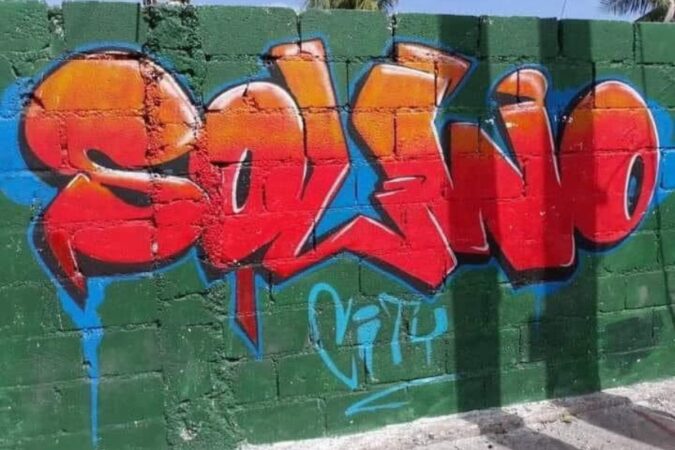
Symbolic graffiti bearing the inscription « Solino City » on a wall in the Solino district. |©Toulimen
After 20 months of resistance, Solino fell completely under the control of the Viv ansanm criminal coalition.
Other neighborhoods like Tabarre, Delmas, and Nazon were attacked, pushing more than 5,000 people to flee their homes.
Bordering Solino, the Poste Marchand district also suffered the devastating gang attacks on December 15, 2024.
Since January 2024, the attacks have become more violent in Solino, stresses Jules.
“Their frequency, but also the number of bandits deployed, have increased,” he informs AyiboPost.
Before, Solino was only targeted on the Port-au-Prince side.
But since the alliance between Kempes Sanon and Barbecue, the entire Viv ansanm federation of gangs has united against the neighborhood.
“The slum was prized for its location,” explains Jules.
Providing access to the Nazon and Bourdon neighborhoods, Solino allowed gangs to control downtown Port-au-Prince as well as the entire Delmas highway.
According to the political activist, gang leader Kempes Sanon showed interest in Solino because the neighborhood allowed him to more easily transport the people he kidnaps to his stronghold in Bel-Air.
However the gang leader encountered resistance from neighborhood residents.
“The latter refused to let their neighborhood become a transit point for kidnapping. Hence the first attack in March 2023, carried out by the gangs to repress this resistance,” explains Jules.
For him, the Viv ansanm gang coalition has allied itself with Kempes in 2024, “because they know that with Solino, they have the opportunity to expand into downtown Port-au-Prince.”
However, explains Jelin Esaï Jules, “Barbecue is more interested in the Delmas highway. Particularly to businesses. The head of the group called G9 wants to have control over all of the companies there.”
Together, Jules continues to AyiboPost, Kempes and Barbecue hit Solino hard.
The Viv ansanm gang coalition allied itself with Kempes in 2024, “because they know that with Solino, they have the opportunity to expand into downtown Port-au-Prince”.
“October 17 was the deadliest of all the offensives launched. The thugs killed and kidnapped many people, including young men and women,” he laments.
On October 26, the bandits finally identified the activist’s house and burned it.
But the family who lived there had time to flee.
At the time of the tragedy, Jelin Esaï Jules was already in the United States. He says he resisted the idea of leaving for a long time, but adds that his involvement in his community and in other national movements “intensified the threats against him”.
His family began to put pressure on him, fearing that the gang threats would come to fruition.
Jules was already a victim in 2019.
That year, he took part in a demonstration against the power of the late President Jovenel Moïse.
Arriving in Pétion-Ville, he was riddled with rubber bullets.
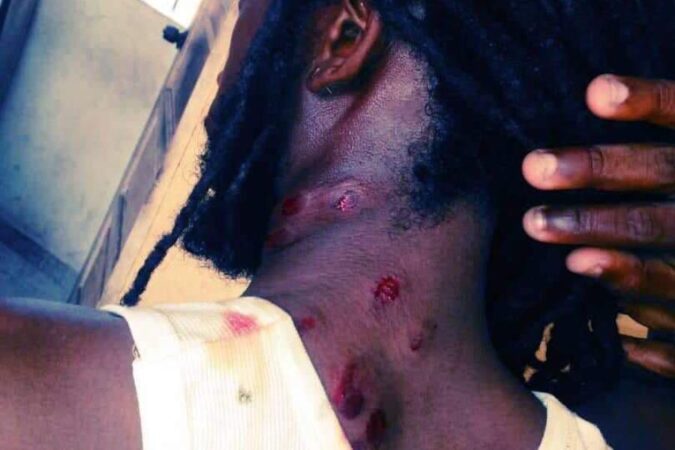
Activist Jelin Esaï Jules injured by rubber bullets during a demonstration in Pétion-Ville in 2019. |©Unknown
This striking episode from 2019 was just the beginning of a series of disillusions for Jules, who also recalls more recent political frustrations that contributed to his decision to leave.
Jules regards the formation of the Presidential Transitional Council (CPT) and the “distortion of several popular structures,” including Nou pap dòmi, as other sources of frustration that prompted him to leave.
According to him, Nou pap dòmi and many other organizations ended up following the same logic as any other political party.
This, in his opinion, because they “agreed to join agreements that have aggravated the current crisis, in particular by approving the establishment of a CPT favorable to the occupation of the country by a foreign force.”
“However, he continues, from 2018 to 2023, popular movements were not just a matter of the resignation of the late President Jovenel Moïse. They demanded a change in the current system and a rupture with international interference.”
On August 22, 2024, Jelin Esaï Jules took a flight to the United States.
Once on American soil, he says, two immigration agents intercepted him and six other men.
But he explains that his dreadlocks, piercings, and tattoos attracted the attention of American law enforcement who decided to expel everyone before him.
“The agents seized my phone. They searched it and came across images of me in demonstrations in Haiti. They see me talking to journalists or with my body riddled with bullets,” he explains to AyiboPost.
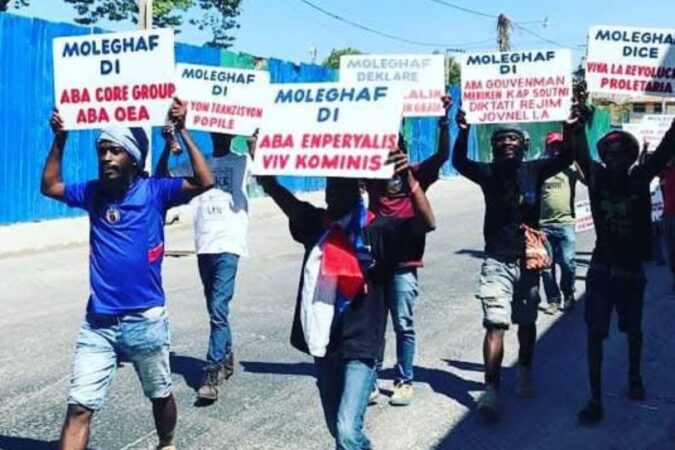
Activist Jelin Esaï Jules accompanied by other activists during a demonstration in Port-au-Prince. |©Toulimen
But it is mainly photos of him in Cuba that interest them.
In 2022, Jules was in Fidel Castro’s country.
He had the slogan “Hasta la victoria siempre” tattooed on his arm, a famous revolutionary slogan popularized by Che Guevara, whose portrait also adorns his back.
On his foot, he chose that of Hugo Chávez, the former Venezuelan president known for his fiery speech against imperialism.
Intrigued by these symbols, the agents wanted to know who he was, as well as the reason for his trip.
They therefore began to question him.
“The questioning lasted more than two hours,” underlines Jules who confides that he was very struck by this first contact with Uncle Sam’s country.
Once released, he joined his host family in New Jersey.
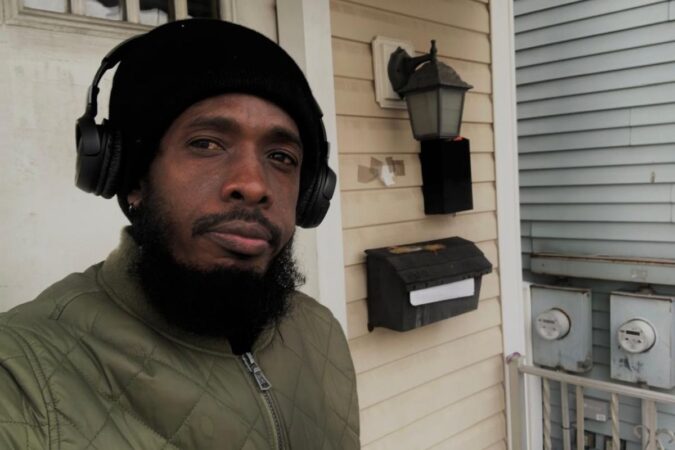
Activist Jelin Esaï Jules in New Jersey in August 2024 |©Jelin Esaï Jules
But four months later, Jules says he feels out of place. He maintains that the United States is involved in Haiti’s misfortune.
Consequently, the political activist judges that it will always be impossible for him to integrate into this country.
Seeing himself as someone forced to take a step back, Jules plans to return to Haiti by 2025.
He recognizes that the threats are real and that death is a possibility.
But the activist considers his political commitment as a life choice. “I know what I got myself into, he says. I will not betray my principles.”
Cover image: Jelin Esaï Jules speaking to journalists during a demonstration in Solino. |© inanam image
► AyiboPost is dedicated to providing accurate information. If you notice any mistake or error, please inform us at the following address : hey@ayibopost.com
Keep in touch with AyiboPost via:
► Our Channel Telegram : Click here
► Our Channel WhatsApp : Click here
► Our Community WhatsApp : Click here

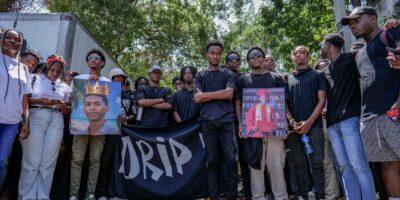
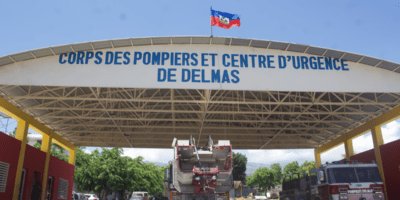




Comments